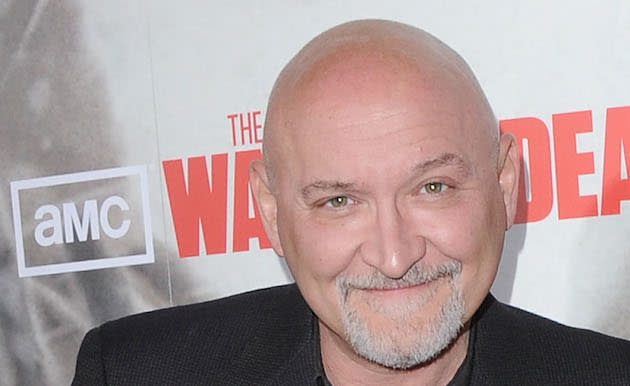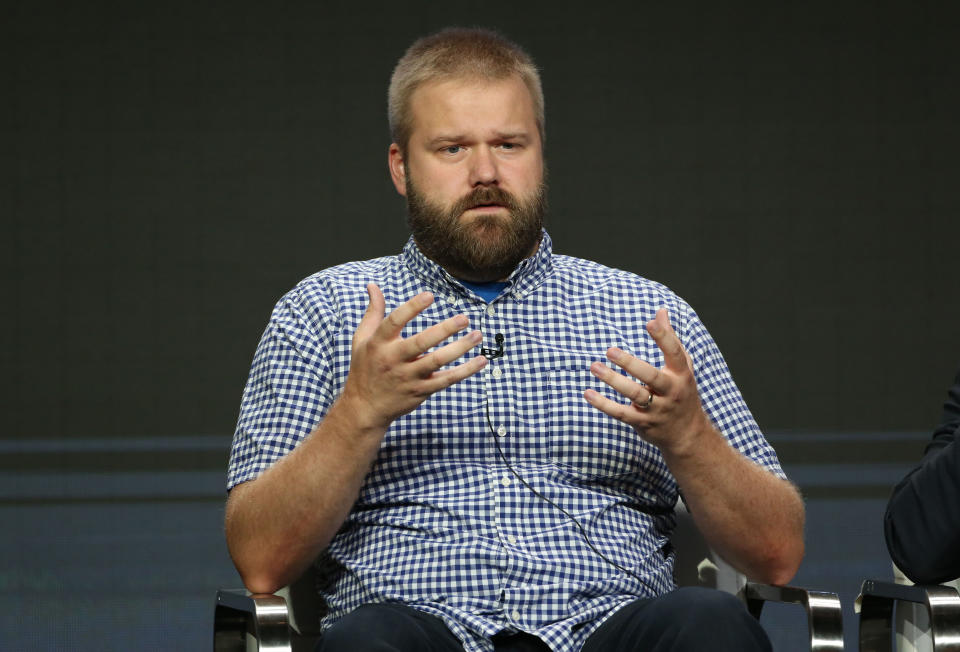‘Walking Dead’ Lawsuit: Frank Darabont Lawyers Compare AMC Series To Iconic ‘ER’ – Update

UPDATED throughout, 1:12 PM: Was The Walking Dead executive producer Frank Darabont merely being an “artiste” when he threatened coworkers with bodily harm? Did AMC boost Darabont’s profit participation this summer as a “stunt” to distract from the more significant amounts the former showrunner claims he is owed?
This morning’s arguments in a Manhattan courtroom, both for and against AMC’s request to get the lawsuit filed by Darabont and CAA booted, wandered down some interesting byways as lawyers from both sides explored, in arcane detail, the intricacies of licensing fees, most favored nations agreements and the burning question of what, exactly, is the difference between AMC Studios and AMC Network.
That latter distinction should be crucial in whether Justice Eileen Bransten agrees with Darabont’s argument that “affiliate transaction” fees — important in determining licensing fees and, ultimately, Darabont’s profit participation — should apply to the two AMC entities.
AMC says AMC Studios didn’t exist at the time of Darabont’s contact, and so those more potentially lucrative (for Darabont and CAA) affiliate transaction provisions don’t apply. AMC attorney John V. Berlinski characterized the arguments made today by Darabont/CAA attorney Jerry D. Bernstein — that AMC’s recent amended deal with TWD EP Greg Nicotero and others (see below) was a “self-serving” and “desperate” stunt made in anticipation of this hearing — as “faux outrage.”
The judge didn’t seem entirely convinced by AMC’s reasoning. “You’re very facile with your words, very good,” she told Berlinski. She asked, “You’re trying to tell me AMC Network did everything, but in reality we know very, very well that’s not how the system works.”
According to AMC’s attorneys, Darabont has already received $6.5 million in profit participation, and CAA about $6.3 million.
AMC also spent a brief part of the morning session addressing the fired Darabont’s claim that his pay-or-play agreement was violated when he didn’t get all the money he was due for his abbreviated involvement in Season 2.
AMC attorney Daniel Saunders called Darabont’s reading of the pay-or-play provision “tortured and illogical,” and that AMC was within its rights to fire the executive producer.
“The point is,” the judge responded, “in this particular case, for apparently no known reason, his services were no longer required, he gets terminated. Therefore he doesn’t get paid — for not being there on a full-time basis? In a sense, it’s illogical.”
“He was terminated, your honor, not arbitrarily at all,” Saunders replied, adding that the grounds for Darabont’s dismissal were “based on significant problems in production,” including “profane emails to coworkers and executives.”
“That is the artiste,” the judge suggested, waving her hand to simulate a sort of martinet flourish. “That is the artistic person.”
Said Saunders, “When Frank Darabont threatens to throw dead bodies out the door, that certainly is a creative issue on the set.”
During the afternoon session, the two sides argued — sometimes literally and loudly — over the show’s licensing fees Darabont’s attorneys called incredibly low and maintained that fees for programs like Mad Men and Breaking Bad were “incomparable” given the lesser viewerships of those series. Darabont attorney Dale Kinsella said a more appropriate comparison would be to the massively popular ER.
Also debated were the specific Modified Adjusted Gross Receipts deals between AMC and other producers including TWD‘s Greg Nicotero. AMC maintains those producers signed off on the same terms now disputed by Darabont. Berlinski repeatedly mentioned that only Steven Spielberg has merited more favorable terms.
“If I hear Mr. Spielberg’s name again,” the judge barked at one point, “I’ll hold you in contempt.”
Following the hearing, AMC released the following statement to Deadline:
“We appreciated the opportunity to spend a day before Justice Bransten defending against this attempt by Frank Darabont and CAA to rewrite their contracts through the courts. This lawsuit is an attempt to capitalize on success that came as a result of AMC taking a risk and greenlighting ‘The Walking Dead’ after it had been passed on by many other networks, and AMC’s successful management of the franchise long after Frank Darabont was gone from the show. We look forward to the Court’s ruling on our motion for summary judgment in this case. Frank Darabont and CAA are entitled to the millions they have already been paid and the tens of millions more they will make over time. It is not legal, fair, nor appropriate for them to distort the contracts after the fact to gain what they are not entitled to.”
As for a time frame on her decision, Bransten was noncommittal, telling attorneys that she was in her final year on this bench, and she hoped she’d get to preside over any possible trial.
PREVIOUSLY, 6:59 AM: Nearly four years after former The Walking Dead executive producer Frank Darabont and CAA sued AMC over what is now $280 million in profits from the zombie apocalypse blockbuster, the two sides are going head to head today in a Manhattan courtroom. In a bitingly bitter battle, the potentially pivotal hearing could determine what direction things go next or if the whole case dies.

With a trial penciled in for 2018, attorneys will argue this morning in front of Justice Eileen Bransten on their long-gestating respective motions for summary judgment in the matter Darabont and CAA first filed in December 2013. In the case of AMC, which is represented by Donald Trump’s lawyer Marc Kasowitz and his firm, it’s a trial-avoiding motion to see Darabont and his uber-agency’s extensive claims of limbo low license fees, slippery vertical integration and more “dismissed in their entirety.”
A definitive ruling by Bransten on the motions is not anticipated today. Among those in the courtroom tho ughare Kasowitz and, on Darabont and CAA’s side, attorney Dale Kinsella. A strong presence in Hollywood legal matters, Santa Monica-based Kinsella Weitzman Iser Kump & Aldisert LLP, along with NYC’s Blank Rome, are repping the plaintiffs.
However, even with a massive and incendiary document unsealing by both sides back in July in anticipation of today’s originally August 24 scheduled hearing, new deals and a new TWD lawsuit could actually end up playing a significant role in this case – and in today’s arguments and Bransten’s decision.
One of the new deals is TWD EP Greg Nicotero suddenly being given a percentage of the lucrative Modified Adjusted Gross Receipts near the end of the seventh season of the series based on Robert Kirkman’s comics. The other new deal was Kirkman himself and his Skybound Entertainment inking an overall pact with Amazon this summer.

Made public August 11, the Kirkman agreement with the House of Bezos was followed three days later by a new lawsuit against AMC that could dwarf that of Darabont and CAA, as well as reinforce it. Looking at somewhere near $1 billion in payouts, TWD creator and EP Kirkman, fellow EPs Gale Anne Hurd and David Alpert, plus former EPs Glen Mazzara, who was fired as TWD showrunner in late 2012, and Charles Eglee, are now claiming AMC also ripped them off big time and for big bucks.
“The defendant AMC Entities exploited their vertically integrated corporate structure to combine both the production and the exhibition of TWD, which allowed AMC to keep the lion’s share of the series’ enormous profits/or itself and not share it with the Plaintiffs, as required by their contracts,” the August 14 complaint in LA Superior Court stated in terminology that’s striking like that of the late 2013 profit-participation suit from Darabont and CAA.

“We have enormous respect and appreciation for these plaintiffs, and we will continue to work with them as partners, even as we vigorously defend against this baseless and predictably opportunistic lawsuit,” said AMC in statement of response last month to this new legal challenge.
Noteworthy is that the Kirkman deal with Amazon and the EPs’ lawsuit both came after a July 13 revelation buried in documents in the Darabont and CAA case. While fighting the Darabont and CAA lawsuit’s claims that they were owed millions more, AMC’s improved imputed license fee formula in the MAGR definition suddenly led to the Mob City creator and the agency being paid “more than $3 million, each, through March 31, 2017.”
Related‘Ride With Norman Reedus’ Gets Season 3 Renewal From AMC Before Season 2 Debut
After scoffing at Darabont and CAA’s claims for years and denying there was anything depressed about the TWD license fee, this apparent generosity saw Kirkman, Hurd, Mazzara and Albert receiving millions too as a part of their individual deals. If the new AMC payouts were designed to blunt Darabont and CAA accusations and financial claims, they look to have backfired in the tactical and strategic sense as the other EPs obviously took a closer look at the books and didn’t like what they found.
Amidst pushing for their own partial summary judgment and rejecting the defendant’s motion, expect Darabont and CAA’s Hollywood heavyweight lawyers to pound AMC today over the new license fees and payouts. Also don’t be surprised to hear them refer to the new lawsuit from Kirkman, Hurd and crew as a further example of the way AMC treats its talent and content creators.
The fact is, for the most part, AMC and parent company AMC Networks have been publicly pummeled for their alleged business practices by The Shawshank Redemption director since he and CAA took them to court. Accused by Darabont and CAA’s legal team of a plethora of self-serving and pocket stuffing sleight of hand moves, AMC’s attorneys at Kasowitz Benson Torres LLP attempted unsuccessfully to have the case tossed out in February 2016.
When that failed, the Josh Sapan-run company and its lawyers tried to turn the shame spotlight on the showrunner they pink slipped back in July 2011 midway through production on the second season of TWD. As a part of the long orchestrated and dense document dump in mid-July this year, AMC spewed into the public record a catalogue of highly inappropriate, “f**k you all” and other expletives filled emails from Darabont during his time running TWD.
That maximum effect action generated a lot of negative attention on Darabont, as surely was the intention. It also spurned Darabont pal and Sons Of Anarchy creator Kurt Sutter to soon afterwards openly and scathingly term the action to be a “#c**tmove” on AMC’s part.

“Rather than a referendum on me, this lawsuit is about AMC’s radically undervaluing The Walking Dead in order not to share profits in a manner reflecting the show’s actual fair market value,” Darabont himself stated in that affidavit made public over two months ago. “This lawsuit is also about AMC’s refusal to share the unprecedented success of the show with the people who actually created that success for them, and about AMC’s self-dealing and corporate greed,” he added.
Put another way, Rick Grimes, Negan and Season 8 of The Walking Dead aren’t back until October 22, but it’s war right now at 60 Centre Street in NYC.
Related‘Fear The Walking Dead’ Co-Creator Dave Erickson Inks Overall Deal With Sony TV
Related stories
David Madden Officially Named President Of Original Programming For AMC, Sundance TV & AMC Studios
Lionsgate-Backed Telltale Games Gets New Boss
'Ride With Norman Reedus' Gets Season 3 Renewal From AMC Before Season 2 Debut
Get more from Deadline.com: Follow us on Twitter, Facebook, Newsletter


